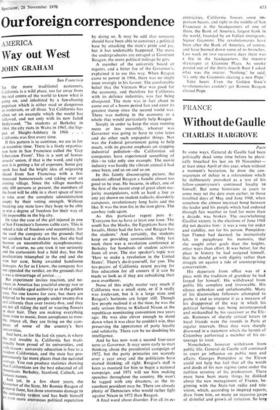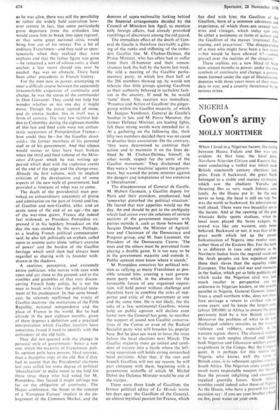FRANCE
Without de Gaulle
CHARLES HARGROVE
Paris In some ways, General de Gaulle had been politically dead some time before he physi- cally breathed his last on 10 November— at least since April of this year, when without a moment's hesitation, he drew the con- sequences of defeat in a referendum which he deliberately provoked as a test of his fellow-countrymen's continued loyalty to himself. But some historians in years to come may set the date even earlier, to those troubled days of May and June 1968, when somehow the almost mystical bond between the leader and his people which had endured through fair weather or foul for more than a decade, was broken. The overwhelming Gaullist victory in the elections of June 1968 did not deceive him : it was a vote for order and stability, not for his person. Pompidou- lian France had dawned; he instinctively felt, to paraphrase his memoirs, that she sought other goals than the heights, other ways than effort. It was better, for the place in history he had assigned himself, that he should go with dignity rather than struggle on against a tide of unenterprising conservatism.
His departure from office was of a piece with the tradition of grandeur he had forged for himself. His withdrawal from public life complete and irrevocable. His silence unbroken and unfathomable. Many of his disconsolate followers attempted to probe it and to interpret it as a measure of his disapproval of the way in which his political heritage was being misinterpreted and mishandled by his successor at the Ely- see. Rumours of sharply critical letters to loyal friends went the rounds in Paris at regular intervals. Once they were sharply disowned in a statement which the hermit of Colombey authorised a member of his en- tourage to issue.
Nonetheless, however withdrawn from public life, General de Gaulle still continued to exert an influence on public men and affairs. Georges Pompidou at the Elysee could not help but feel that all the words and deeds of his new regime came under the ruthless scrutiny of his predecessor. There must have been many things he disliked about the new management of France, be- ginning with the State-run radio and tele- vision, which, according to inspired reports, drew from him, on many an occasion gasps of disbelief and growls of irritation. So long
as he was alive, there was still the possibility or rather the widely held conviction how- ever remote in fact, that some particularly gross departure from the orthodox line would cause him to break into open reproof, or that some great national crisis would bring him out of his retreat. For a lot of ordinary Frenchmen—and they said so spon- taneously when they realised they were orphans and that the father figure was gone —he remained a sort of ultima ratio, a sheet anchor, a last resort should one ever be needed. Age was no obstacle. There have been other precedents in French history.
For the men now in power, attempting to steer a difficult course between the apparently irreconcilable exigencies of continuity and change, he was the statue of the commander in Don Giovanni. They could not help but wonder whether or not one day it might move. Though the statue seemed of stone, and its silence leaden, this in itself was a form of censure. The very few faithful bid- den to Colombey during the eighteen months of this last and final exile were not enthus- iastic supporters of Pompidoulian France— how could they be—but the Gaullist demi- soldes, the former members of his personal staff or of his government. And that silence would sooner or later have been broken when the third and final volume of the liVm- oires d'Espoir which he was writing ap- peared which deal with the explosive events of the end of the reign and the change-over. Already the first volume, with its implicit criticism of the devaluation and of some aspects of the new style of government, had provided a foretaste of what was to come.
The death of the providential man pro- voked an extraordinary unanimity of praise and admiration on the part of friend and foe, of Gaullist and non-Gaullist, alike, and an acute sense of the end of an age—the age of the war-time giants. France did indeed feel widowed, as President Pompidou ex- pressed it in his lapidary broadcast on the day she was stunned by the news. Perhaps, as a leading French political commentator said, he also felt politically an orphan, called upon to assume quite alone 'solitary exercise of power' and the burden of the Gaullist heritage which until then had always been regarded as sharing with its founder with- drawn in the shadows.
A cautious, perceptive, and extremely astute politician. who moves with eyes wide open and ear close to the ground, and to the rumbles and grumbles of that very discon- certing French body politic, he is not the man to break with iclats the political testa- ment of his predecessor. In that same broad- cast, he solemnly reaffirmed the trinity of Gaullist doctrine: the institutions of the Fifth Republic, national independence and the place of France in the world. But he had already in the past eighteen months, given of these dogmas a definition and a practical interpretation which Gaullist loyalists have sometimes found it hard to identify with the orthodoxy of the old faith.
They did not quarrel with the change in personal style of government: better a new one, which the majority of Frenchmen, pub- lic opinion polls have. proven, liked anyway, than a deceptive copy of the old. But if they had to accept that the Presidential elections last year called for some degree of political 'liberalisation' to make room in the fold for those stray sheep who had voted for M. Pompidou, they feared it might infringe too far on the obligation of continuity. The Hague conference, the threat to the concept of a 'European Europe' implicit in the en- largement of the Common Market, and the demons of supra-nationality lurking behind the financial arrangements decided by the Council of Ministers last April, to mention only foreign affairs, had already provoked rumblings of discontent among the old guard.
The immediate effect of the death of Gen- eral de Gaulle is therefore inevitably a slos- ing of the ranks and stiffening of the ortho- dox Gaullist line. M. Chaban-Delmas, the Prime Minister, who has often had to suffer from their ill-humour and their remon- strances took the bull by the horns last week. He told a meeting of the Gaullist parlia- mentary party, to which less than half of the 286 members showed up, he would not tolerate that little groups quoting Gaullism as their authority behaved in turbulent fash- ion in the country. If need be, he would 'tame' them. The reaction was immediate. 'Presence and Action of Gaullism' the ginger- group within the Gaullist majority, of which M. Jacques Vendroux, General de Gaulle's brother in law, and M. Pierre Messmer, the former Defence Minister, are leading lights, felt these strong words were intended for it. At a gathering on the following day, their fifty-two members decided there was no cause to dissolve their association. On the contrary, 'they were determined to continue their action and to maintain it on the lines de- fined by M. Chaban-Delmas himself, in other words, respect for the unity of the Gaullist movement.' They disclaimed that they were a 'war machine' against the govern- ment, but warned the prime minister against the dangers and temptations of too extensive a 'liberalisation'.
The disappearance of General de Gaulle, M. Hubert Germain, a Gaullist deputy for Paris and their president, emphasised, had 'somewhat disturbed the political situation.' He feared that new appetites would see the day. An end should be put to the ambiguity which had arisen over the relations of certain sections of the government majority with parties outside it, such as those between M. Jacques Duhamel, the Minister of Agricul- ture and Chairman of the Democracy and - Progress group, and M. Jean Lecanuet, the President of the Democratic Centre. 'The ones and the others must be prevented from playing a double game. It is too easy to be in the government majority and outside it. Public opinion must know where it stands.'
M. Pompidou conceives his political mis- sion as rallying as many Frenchmen as pos- sible around him, creating a vast govern- ment party which, in the absence for the forseeable future of any organised opposi- tion, will hold power without challenge and therefore have to combine the roles of sup- porter and critic of the government at one and the same time. He is not likely, for the sake of a few sentimental Gaullists, whose hold on public opinion will decline even faster now the General has gone, to sacrifice the support of sound non-Gaullist conserva- tives of the Centre or even of the Radical Socialist party who will broaden his popular base. But he does not want to force the issue before the local elections next March. The Gaullist majority must go united and confi- dent of victory into a battle where the left- wing opposition still holds strong entrenched local positions. After that, if the root and branch Gaullists will not see reason, he will part company with them, beginning with a government reshuffle of which M. Michel Debre the Defence Minister would be one of the victims.
There were three kinds of Gaullism, the former political editor of Le Monde wrote ten days ago: the Gaullism of the General, an almost mystical passion for France, which has died with him; the Gaullism of the Gaullists, born of a common adventure and experience, of which there are sev.eral vani. eties and vintages, which today can only be either a testimony or form of action; and the Gaullism of the masses 'irrational, fluc- tuating, and precarious'. 'The disappearance of a man who might have been a last resort —but would he have allowed it?—cannot prevail over the realities of the situation.'
These realities are a new Head of State now sixteen months in power, under the twin symbols of continuity and change; a govern- ment formed under the sign of liberalisation; deputies with three years more of their man- date to run; and a country threatened by no serious crises.















































 Previous page
Previous page